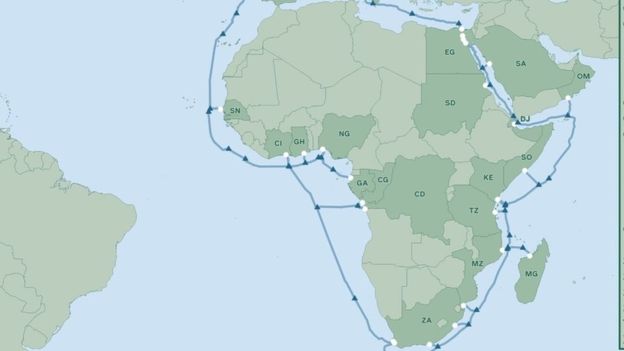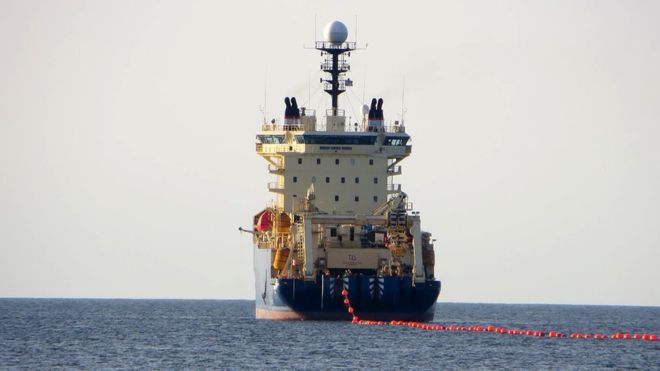Facebook is teaming up with telecoms companies to build a 37,000km (23,000-mile) undersea cable to supply faster internet to 16 countries in Africa.
Its length - almost equal to the circumference of the Earth - will make it one of the longest, it said.
It is part of a long-running bid by Facebook to take its social media platform to Africa's young population.
Ready for use by 2024, it will deliver three times the capacity of all current undersea cables serving Africa.
"When completed, this new route will deliver much-needed internet capacity, redundancy, and reliability across Africa, supplement a rapidly increasing demand for capacity in the Middle East, and support further growth of 4G, 5G, and broadband access for hundreds of millions of people," said Facebook in a blog.
Africa lags behind the rest of the world when it comes to internet access, with four in 10 people across the continent having access to the web, compared with a global average of six in 10.
But the continent represents huge opportunities for technology firms and businesses with its population of 1.3 billion.
The cost of the 2Africa project - which will connect Europe and the Middle East to the continent - has not been disclosed but Bloomberg reported it could be close to $1bn (£820m).

Sub-sea cables carry the vast majority of the world's inter-continental data. They can handle much more data and offer faster transmission at a lower cost compared with other methods.
The cable - which will be built by Nokia Oyj's Alcatel Submarine Networks - will run along the bottom of the Atlantic Ocean, the Indian Ocean, the Mediterranean Sea and the Red Sea.
It will be buried deeper than previous systems for greater protection against external damage from things such as ships' anchors.
The fibre-optic cables will have double the capacity of older ones, making use of Spatial Division Multiplexing (SDM1) technology.
Facebook is teaming up with Johannesburg-based MTN Group, Telecom Egypt, Vodafone and Orange SA.
Vodafone said it would pave the way for developing digital businesses on the continent.
"We need to ensure that there is enough internet capacity to not only get people online, but to help build a modern digital society that includes services that require a large amount of data transfer, such as cloud computing or video," said Nick Gliddon, director of Vodafone Carrier Services.
As well as helping businesses, it will also improve healthcare and education, he added.
Latest Stories
-
Gold hedging programme will target a portion of our reserves – BoG Governor
2 minutes -
Equity Health Insurance signs up for JoySports Invitational Tournament 2025
13 minutes -
Energy and Green Transition Minister visits Energy Commission on familiarisation tour
15 minutes -
‘Don’t wait for my death to pay tributes’ – Ali Jarrah appeals to state for support
37 minutes -
Today’s Front pages: Thursday, July 31, 2025
45 minutes -
President Mahama expresses concern over renewed violence in Bawku
48 minutes -
AG knows the state isn’t blameless – Lord Mensah on Duffuor banking case settlement offer
54 minutes -
Two girls and one employee killed after explosion at Nebraska biofuels plant
3 hours -
Analysis: Ghana’s gold exports surge in 2025, surpasses total imports for first time in a decade
3 hours -
GH¢2bn was on the table, why collapse uniBank? – Prof Lord Mensah questions closure
3 hours -
Mahama reiterates gov’t’s commitment to expand Damongo Water Supply system
3 hours -
Bank of Ghana tightens rules on remittances amid compliance failures
3 hours -
Gov’t releases $1m to avert Memphis University scholarship crisis
3 hours -
President Mahama rallies African leaders to empower reparations bodies
3 hours -
Parliament endorses use of oil and mineral revenues for ‘Big Push’ projects
4 hours

